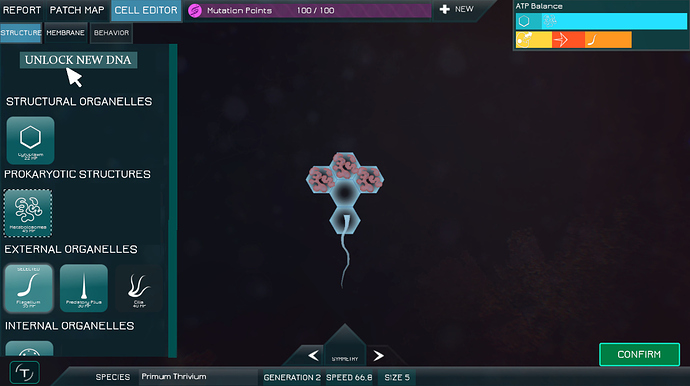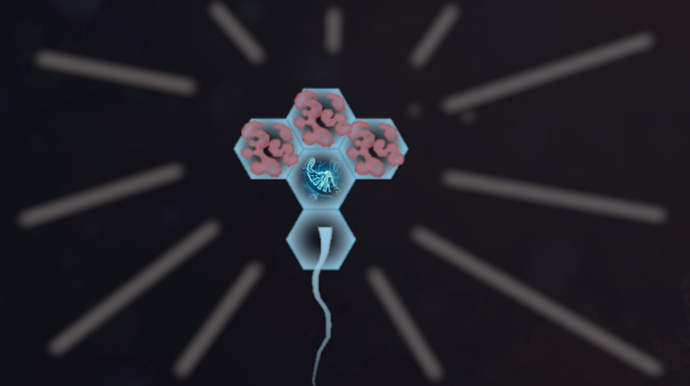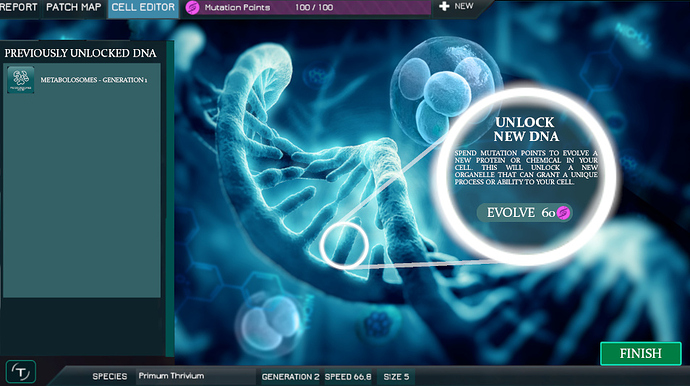There’ve been concepts floating around for how to introduce an element of progression to organelles for a while. I’ve also increasingly felt a need for organelle progression while playtesting the latest versions. After playing the latest release and thinking on it, I devised a system for how it could work.
Reasons for Unlocking Organelles
These are some of the reasons I felt an unlock system was necessary. I want to make sure to add such a progression system without hindering the player's fun, rather, I think if properly implemented it would greatly enhance it.
-
I feel like some mutations are currently too easy to achieve, and we don’t have any way to make them rarer. Even if we make something cost 100 MP to place, you can literally evolve it the first time you enter the editor. Realistically, there are many rare mutations that have only rarely occurred in nature. Adding a form of progression could make achieving these feel more rewarding. Please know that I am trying so hard not to sound like that EA “the intent is to provide players with a sense of pride and accomplishment” quote right now
 .
. - Evolution in the later stages involves a lot of progression. Just look at the Aware Stage; you can’t just evolve wings as a jellyfish. You need to evolve a cartilagenous notochord first, and then from the notochord a proper bony spine. Then from the spine you evolve segmented vertebrae. Then you evolve a shoulder bone mantle, where two sockets begin to form as you evolve arms. And finally, feathers or flaps of skin on those arms to first evolve gliding, and then flying. Same with the civilization stages, you can’t just invent fire and then in the next generation build a steam engine. Whereas in the microbe stage, WHAM I am an iron respirator now. WHAM I’m a photosynthesizer now. WHAM I produce toxins now.
- There is already a level of unlocking present in the Microbe Stage concept. Many organelles in the Microbe Stage are initially locked behind the nucleus. Mitochondria, Chloroplasts, and other endosymbiotic organelles need to be unlocked via assimilation (still only in concept). Agents, last we discussed them, are evolved via random unlocks, where when you first evolve an agent vacuole it generates a random agent.
The System - Random Unlocks
So what do I propose? Adding an ability to randomly mutate (AKA unlock) new organelles. Let me explain how.
Any mutation that involves a unique chemical or protein starts the game originally as locked. Let’s call this group of organelles “Protein Organelles”. This includes Metabolosomes, Thylakoids, Chemosynthesizing Proteins, Rusticyanin, Nitrogenase, and the Oxytoxisome. All of those provide a unique function or process as a result of a unique chemical or protein. Additionally, future planned organelles that represent unique proteins like Antifreeze Proteins and Pigment Proteins also fall into this category. This would mean that the player starts the game only being able to place Cytoplasm, Flagellum, Pilus, or Nucleus.
Well how would the player unlock these Protein Organelles? Three ways:
- Spend points in the editor to randomly unlock a new Protein Organelle. This represents the cell evolving the ability to create that new protein. This is very similar to the planned agent unlocking system
- Absorb DNA from the environment to randomly unlock a new Protein Organelle. Every time you absorb free floating DNA in environment, there’d be a chance to unlock a random new Protein Organelle. This represents the cell acquiring the genes to create a new protein from foreign DNA.
- Absorb/assimilate another cell to randomly unlock a new Protein Organelle it has. Every time you absorb/assimilate a cell, you’d have a chance to unlock one of the Protein Organelles he has unlocked.
Once unlocked, a player now permanently has access to that Protein Organelle. This represents that the genes for that protein now exist in that species’ DNA. A player can place it in their cell in the same editor session, or in the next editor session if unlocked via method 2 or 3.
If we set the MP cost at 60, it would mean the player could at maximum unlock one new Protein Organelle per generation, assuming no others are found via method 2 or 3. We could lower this cost if we want to increase the rate. Also we could make all Protein Organelles cost 40MP or less so that you could at least place one in the same generation you unlocked it (or perhaps we make the first one free?). We could make some proteins more likely to unlock than others if we wanted to balance how rare they are.
Gameplay Reasoning
These are the main gameplay reasons I felt made a random unlock system best:
- It allows for truly rare mutations. It adds a guaranteed way to ensure that organelles based on unique proteins are uncommon, and therefore extremely valuable once evolved. If you have a rival that evolves a unique protein, it’s not as simple as just “Oh well I’ll just evolve it too in my next generation”.
- It allows for rare mutations to be more rewarding and competitive. Anti-freeze proteins are rare among life, but it gives the species who have them the competitive edge to survive in harsher environments. This lets them live in areas with way less competition. If everyone can evolve them at any time, it’s as simple as a species just plopping one onto his cell and migrating into an ice shelf the very next generation. Without unlockable Protein Organelles, environmental barriers are not very meaningful.
- A similar system was discussed for the agent system back in the day. Why? Because it’s a little too OP to allow the player to choose EXACTLY which agent to evolve on their very first try. Instead, you evolve a random agent, and if you don’t like it, you evolve it in future generations more towards what you want it to do. It was also planned for when the player evolves unique chemicals, poisons, hormones, and pheromones in the Organism Editor.
- There are some mutations in nature that have very few downsides. A good way to balance these would be to make them randomly unlockable, and perhaps a lower chance to unlock than the other mutations. For example, Archaea use membranes made with Isoprene instead of Fatty Acids. This has no known downsides and simply allows Archaea to survive much harsher environmental conditions. The only reason Bacteria and Eukaryotes don’t have them is by pure chance.
- Randomness adds a level of mystery to the unlocking. You don’t know all the possibilities of what you can unlock, so it adds a level of mystery and discovery as you unlock them. Meanwhile, in the current system, you already learn of all the Protein Organelles immediately the first time you enter the editor, so there is no mystery.
- Randomness adds a level of variability and replayability. In civilization, you start on a randomized spawn. If you always spawned in the exact same spot on the exact same map, it would get boring and predictable. This random variability adds replayability, since in new games you will spawn on new and interesting maps. In the Microbe Stage, you might unlock different Protein Organelles in each playthrough (unless you grind and try to unlock them all before advancing to Multicellular).
- It adds a way to set strains of species apart. For example, the evolution of a certain rare mutation could become a signature of a certain species and all its descendants. Look at how the production of silk has become a hallmark of many arthropod species, who likely inherited it from a common ancestor who evolved it.
- It allows the game to be gradually introduced to the player. Instead of them opening up the editor the first time and seeing 100 mutations, they gradually accumulate more available mutations.
- Finally, it just feels wrong to have so many organelles (particularly with unique abilities) unlocked to the player in the very first generation. If you look at the design documents, we have a lot of planned “Protein Organelles”. Do we really want all of them to be immediately available to the player from generation 1?
Scientific Reasoning
There are many scientific reasons behind such a system:
- Unique proteins are rare. For example, iron reduction as a means of producing energy has only ever evolved in one order of bacteria (Desulfuromonadales) and a species called Shewanella. Photosynthesis has only ever evolved 3 times in all of evolutionary history. Speaking of photosynthesis, it first evolved without producing oxygen. Then later, oxygenic photosynthesis was evolved which was more effective. Oxygenic photosynthesis didn’t require anoxygenic photosynthesis to evolve, it was just by pure chance that it evolved later. In an alternate universe, oxygenic photosynthesis could have evolved first, or maybe even not at all. However, in the current system, the player would never choose Anoxygenic Photosynthesis because Oxygenic Photosynthesis will always be available and always be a better option.
- This system only applies to “Protein Organelles”. Structures like cytoplasm, flagella, pilus, nucleus, vacuole, etc. are all excluded from this list. Why? Because the latter mutations use existing proteins and fats that are simply assembled into new shapes. That is something that is very easily done in nature, it is simply telling the DNA to take proteins and fats already assembled in one part of the cell to be assembled in a different shape somewhere else. In terms of evolution, that only requires small changes to the DNA. However, the evolution of new Protein Organelles requires the evolution of entirely new and chemically unique proteins that grant entirely new abilities or processes. This is something that is much more difficult in evolution, or in other words, requires much bigger changes to the DNA and is thus much less likely.
- Evolution always favours repurposing existing structures over evolving new ones. Therefore, the player is incentivized to find ways to use currently available structures/organelles to adapt to its threats over unlocking new ones. Unlocking new ones should only be in times of emergency when there’s nothing to lose, or in times of plenty where the player has no immediate threats and is willing to experiment.
As an example for the scientific basis for this: If you don’t have the genes to naturally produce, say, cyanide in your DNA, it’s going to be very hard (AKA extremely unlikely) to evolve a cyanide gland to eject cyanide on your prey. However, if your body ALREADY has the genes for that, it’s simply a simple reshuffling of your genes to have them produced in a gland instead of where it already existed in your body. Another example, an organism may evolve to repurpose stomach acid he already produces in his stomach, into a spit attack fluid to damage prey.
Summary
Long story short, anything that involves the evolution of a new chemical, protein, or molecule should require a random unlock first. This random unlock would be through spending points in the editor, or acquiring DNA from the environment or other cells.
I’m interested to hear your guys’ input, and whether this is a viable method to add some progression, rarity, and realism to the so called “Protein Organelles”.
EDIT: I put my reasoning in spoilers since the post was already long enough as is.



